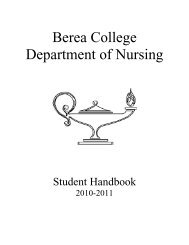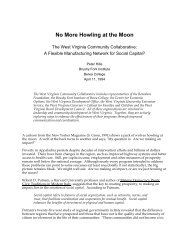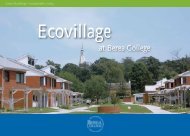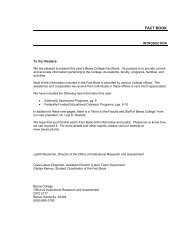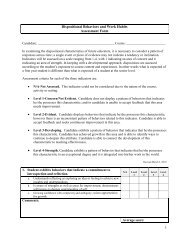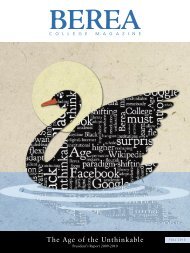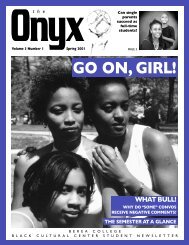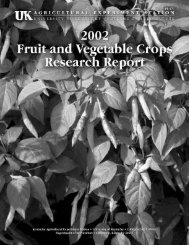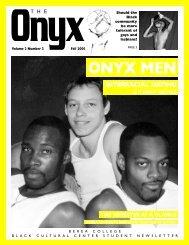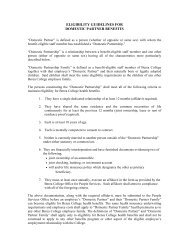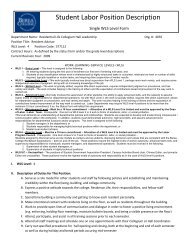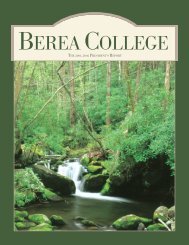What Makes for Peace? - Berea College
What Makes for Peace? - Berea College
What Makes for Peace? - Berea College
You also want an ePaper? Increase the reach of your titles
YUMPU automatically turns print PDFs into web optimized ePapers that Google loves.
October 2005John G. Fee’s five eldest survivinggrandchildren accepted theaward named after theirgrandfather during theFounder’s Day convocation.The ceremony in honor ofthe <strong>College</strong>’s founder wasattended by more than 50of his descendants.A national history symposium,“Race, Repression, andReconciliation,” explored theblack experience in Appalachiaand America. The event drew anational audience to <strong>Berea</strong> andfeatured Dr. Eric Foner and Dr.Clayborne Carson of Columbia andStan<strong>for</strong>d Universities, respectively.More than 150 students andstaff from 25 college campusesattended the “Engaging OurWorld: A Southeastern GlobalLeadership Conference,”organized by <strong>Berea</strong><strong>College</strong> students andvolunteers to raiseregional awarenessof global issues thatinclude trade andeconomic justice, globalAIDS, environmentaljustice, and world hunger.Dr. Gordon McKinney, retiredDirector of the AppalachianCenter at <strong>Berea</strong> <strong>College</strong>, receivedthe Cratis Williams/James S. Brownservice award from the AppalachianStudies Association (ASA) and ChadBerry, President of the ASA.Tashia Bradley joined <strong>Berea</strong> asDirector of the Black CulturalCenter. She previously directedthe Office of MulticulturalAffairs and InternationalStudent Services at MillikinUniversity and facilitatesworkshops on diversity,leadership, gender, andintercultural understanding.December 2005Extending <strong>Berea</strong>’s Legacy: A Campaign<strong>for</strong> the Twenty-first Centuryexceeded its goal of raising $150million by the <strong>College</strong>’s 150thanniversary by $12 millionthanks to donors who mademore than 106,000 gifts.Tammy Clemons, ’99,accepted a two-yearposition as campus sustainabilitycoordinator. Clemonswill initiate and strengthensustainable practices and fostercollaboration throughout thecampus community.January 2006Two grants from a single benefactortotaling $270,800 allowedthe <strong>College</strong> to hire a full-timesound archivist and increasedopportunities <strong>for</strong> students toexperience traditional musicand dance through accessto the archives. The grantalso funded musicfaculty, fellows, anddance musicians, aswell as the purchase oftraditional instruments<strong>for</strong> student use.Choice magazineselected Dean of theFaculty Stephanie Browner’sbook, Profound Science andElegant Literature: ImaginingDoctors in Nineteenth-CenturyAmerica, as an OutstandingAcademic Title <strong>for</strong> 2005.Marlon Perry, ‘08History Major & ReligionMinorInside the First Baptist ChurchMarlon Perry seems right athome, calling choir membersby name and asking after eachone’s health and family. Thejunior from Birmingham,Alabama spent his summer researching<strong>Berea</strong>’s black churches with civil rights historian Dr. Dwayne Mack. “Itwas a great experience,” Marlon says.More than re-tracing the footsteps of protest marchers to Frank<strong>for</strong>t,more than researching property sold to black people, it was the storyof strong people that most impressed Marlon. “I learned a lot fromDr. Mack about researching through an interview. I learned how toget people to relax, ease into the questions, and find photos that toldthe stories of the churches of Middletown, Farristown, and Bobtown.”Through his work with Dr. Mack, Marlon also learned what it takes tobuild community.Listening deeply is one of Marlon’s talents. His experiences as achaplain junior year at Blue Ridge residence hall taught him much abouthow others see God. “We may have similar feelings of religious faith,but different views,” he says. “It’s natural. The worst thing you can dois to be closed-minded and make assumptions. Even if we don’t agree,it’s important to listen. If you are trying to effect a positive change, youneed to learn to work through your impulse to respond through argument.Empathy is a great strength.”Last year Marlon received the Father Henry Parker scholarship, givento a student of African descent who demonstrates high academicachievement, service, promotion of interracial understanding, and care<strong>for</strong> others. He recalls sheepishly, “I couldn’t think of anything special Ihad done. It seemed that I got this award just <strong>for</strong> being myself.”His fondest dream is to return to Alabama, attain a divinity degreeat Sam<strong>for</strong>d University outside Birmingham, and minister at his homechurch, Sardis Baptist Church. “No one in their right mind would chooseto be a preacher,” he says, “unless they were able to allow themselvesRiyam Bashir, ‘07Theatre MajorAs trouble brewed in herhomeland this summer,Riyam Bashir returned toJerusalem, Palestine, to seeher family. It was good to behome. She says she went tomarket, shopped, and met friends<strong>for</strong> coffee. “I have no choice but to live asimple daily existence,” she said. “I want to live as a human being—not as a label. The important thing to remember is the person thatyou really are inside.”Stereotypes hurt everyone, Riyam feels, and the media oftencontributes to these biases. “I am not covered head to toe, andneither are many Arab women,” she explains. Just because I’mArab, does not mean I approve of violence. In fact, I am completelyagainst any violence, whether caused by armies or regular civilians.”When she was a teenager her mother, Dr. Lily Feidy, a board member ofAmericans and Palestinians <strong>for</strong> <strong>Peace</strong>, enrolled her in a peace studiescamp, which she attended <strong>for</strong> four years. “It taught me a lot about waysof mediation. It taught me how to listen,” she says. Riyam used thatlistening skill to gather other points of view when she helped the BlackCultural Center and CELTS produce “Works on Social Commentary,” anart show about social injustice at home and around the world.In particular, she has found that taking a role on stage is yet anotherway to step fully into other points of view. After her father died whenRiyam was seven, she was unsure how to carry on until she discoveredtheatre as a way to express herself. “I found I could live a different life,in a different world, inside a different situation.” Theatre offered her, shesays, “a level of sanity, a middle ground where I can stand.” The actorhopes to use a theatre degree and a future master’s in education towork with students with cognitive and physical disabilities.Riyam applauds the <strong>Berea</strong> <strong>College</strong> community as a place that fostersinternational understanding and social justice. “I’ve visited many classesand been a part of discussions that look at issues from different sides.I value the ability to speak my truth at <strong>Berea</strong>. Those professors andFebruary 2006Shannon Wilson, ’81, published<strong>Berea</strong> <strong>College</strong>: An IllustratedHistory, which chronicles thefounding of the <strong>College</strong>and the eight presidentswho have led it.Architect and founder ofAppalshop, Bill Richardsonof Whitesburg, Kentucky,and financial executiveShawn Johnson of StateStreet Global Advisors fromWinchester, Massachusetts joinedthe Board of Trustees.April 2006The Princeton Review’s2007 edition of American’sBest Value <strong>College</strong>s ranked<strong>Berea</strong> second on its list of“Top Ten Best Values <strong>for</strong>Private <strong>College</strong>s.” <strong>Berea</strong><strong>College</strong> was the onlyKentucky school tomake the top ten list.In their three-year studyof the six colleges in theWork <strong>College</strong>s Consortium(which includes <strong>Berea</strong>) the LuminaFoundation showed thatstudents place a higher value oneducation when their work is tiedto the academic environment.Two alumni trustees, CharlotteBeason, ’70, executive director ofthe Kentucky Board of Nursing inLouisville, Kentucky, and seniorinternational trade andintellectual property attorney,Vicki Allums, ’79, of Arlington,Virginia, were appointed tothe Board.The Center <strong>for</strong> StudentOpportunity (CSO) inBethesda, MarylandMarch 2006Phelps Stokes Chapelturned 100 yearsold. After the chapel’shistoric 1902 fire, MissOlivia Egleston PhelpsStokes established a fundto encourage students torebuild the structure usingstudent-made bricks, stonequarried from the <strong>Berea</strong> Ridge,and student-cut lumber from the<strong>College</strong> Forest.Philip D. DeFeo, <strong>for</strong>mer chair-the heights and depths of feeling. As a preacher you will be close tostaff who sit with me and discuss Palestine and Israel’s current war areexpanded support <strong>for</strong> theman and CEO of the PacificExchange and past presidentand CEO of Van Eck AssociatesCorporation, joinedthe Board of Trustees.heartache, but also close to the greatest joy. It’s like Robert Frost’s‘Road Not Taken’. I’m taking a different path.”valued friends. Here,” she affirms, “I can speak my story.”Carter G. Woodson OpenHouse, an annual event thatwelcomes prospective African-American students to campus.



